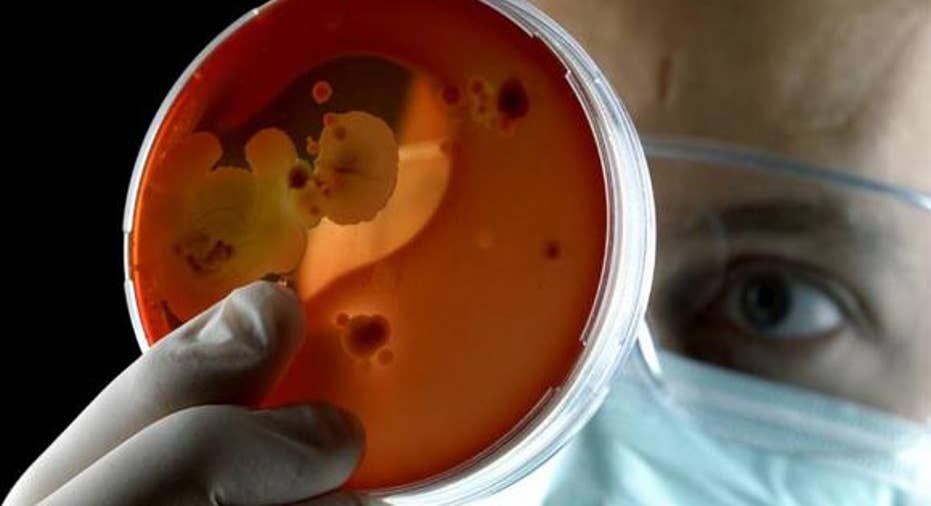Will GlaxoSmithKline plc Raise Its Dividend in 2016?

Image source: GlaxoSmithKline.
It's been a rough 2015 for Big Pharma stocks, which have been whipsawed for much of the year, but the one solace that most large drug developers continue to offer their investors is an above-average dividend yield and somewhat consistent dividend growth. Of the 15 largest drugmakers, roughly three-quarters pay a dividend that's on par or above the average yield of the S&P 500.
Will GlaxoSmithKline raises its dividend in 2016? Dividends can be a critical growth driver for investors' portfolios. Not only do dividends help hedge against moves lower in the price of a stock or the overall market, but they act as a beacon for investors signaling that a company is on solid financial footing. Dividends can also be reinvested, netting more shares of stock and compounding shareholders' gains.
Towards the top of the list for publicly traded pharmaceuticals is U.K.-based GlaxoSmithKline , which sports a dividend yield of nearly 6%. GlaxoSmithKline has relied on the success of its respiratory portfolio, specifically COPD and asthma drug Advair (known as Seretide in overseas markets), and vaccine product portfolio to drive its cash flow and high yield. But should investors expect a juicier dividend payment in 2016? My suggestion: Don't count on it.
Three reasons a dividend increase is unlikely In GlaxoSmithKline's third-quarter conference call, the company maintained a consistent dividend outlook through 2017, although I'm squarely in the skeptics camp on this one as I see potential headwinds possibly wrecking its chance of maintaining a yield near 6%.
To begin with, Advair came off patent all the way back in 2010. For drug developers that's a veritable eternity, but it wasn't until late 2013 that the Food and Drug Administration finally laid out a clear path generic drugmakers would have to follow to get a generic version of Advair on pharmacy shelves. It's only a matter of time before a generic debuts, and GlaxoSmithKline realizes this. By the end of the decade GlaxoSmithKline's management team forecast that Advair/Seretide sales could decline by another 50%. As pricing pressure hits Advair and Seretide in the U.S. and overseas, Glaxo could find its cash flow substantially smaller.
Image source: GlaxoSmithKline.
Another problem is that GlaxoSmithKline's next-generation respiratory drugs, co-developed with Theravance , have disappointed since their launch. For example, Breo Ellipta struggled for multiple quarters to improve its coverage by health-benefit providers, but it appears to have jumped over many of its early hurdles. Now it's Anoro Ellipta that's disappointing Glaxo, Theravance, and investors. Physicians and patients have been taking Advair or Spiriva for years, and GlaxoSmithKline noted during its Q3 conference call that it's having difficulty conveying to physicians that they have new long-term maintenance options available for treating COPD. I do fully expect Glaxo and Theravance to right the ship, so to speak, by boosting physician education and marketing, but this isn't something that's going to happen overnight.
The SUMMIT trial for Breo Ellipta was another disappointing blow to both GlaxoSmithKline and Theravance. Announced in September, the SUMMIT study examined whether or not COPD patients taking Breo were at a statistically significant lower risk of death compared to a placebo. Although the results did demonstrate a modest favorability over the placebo of 12.2% fewer deaths in the Breo arm, the SUMMIT study ultimately failed to reach its primary endpoint. Though Glaxo wasn't counting on a sales boost from a positive SUMMIT study, the trial's failure is nonetheless another knock against the company's next-generation respiratory portfolio.
All hope isn't lost for GlaxoSmithKlineGlaxoSmithKline clearly has headwinds to face in 2016 that I believe will prevent any near-term dividend hikes, but shareholders do have things to look forward to.
Image source: GlaxoSmithKline.
GlaxoSmithKline's transformative asset swap with Novartis is one such reason why there may be light at the end of the tunnel after Advair sales collapse. Under the terms of the deal, Glaxo sold its oncology division to Novartis, Novartis sold its vaccine portfolio (minus influenza) to Glaxo, and the two pharmaceutical giants formed a joint-venture for their consumer health product operations. Glaxo wound up netting billions in cash from Novartis in the deal and also added substantial diversity to its vaccine portfolio. This cash may support Glaxo's current payout (but not an increase), and Glaxo's renewed focus on just a handful of therapeutic indications should result in improved efficiency and lower costs over the long-term.
HIV sales have been another bright spot for Glaxo. ViiV Healthcare, which is majority-owned by Glaxo, has witnessed sales of Tivicay and Triumeq soar more than 100% on a year-over-year basis. HIV/AIDS remains one of the deadliest and pervasive diseases worldwide, meaning there's a long-tail growth opportunity in this indication for ViiV and Glaxo.
Glaxo's management team strongly believes 2016 will be the year it gets its growth back on track. While that could be the case, I remain worried about Advair's declining sales and the struggles of its next-generation respiratory stocks. As such, I'd suggest not being lured in by Glaxo's superior yield and would rather wait on the sidelines until there's discernable top- and bottom-line growth -- especially in respiratory.
The article Will GlaxoSmithKline plc Raise Its Dividend in 2016? originally appeared on Fool.com.
Sean Williamshas no material interest in any companies mentioned in this article. You can follow him on CAPS under the screen nameTMFUltraLong, track every pick he makes under the screen nameTrackUltraLong, and check him out on Twitter, where he goes by the handle@TMFUltraLong.The Motley Fool has no position in any of the stocks mentioned. Try any of our Foolish newsletter servicesfree for 30 days. We Fools may not all hold the same opinions, but we all believe thatconsidering a diverse range of insightsmakes us better investors. The Motley Fool has adisclosure policy.
Copyright 1995 - 2015 The Motley Fool, LLC. All rights reserved. The Motley Fool has a disclosure policy.



















